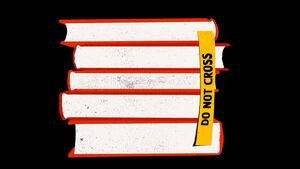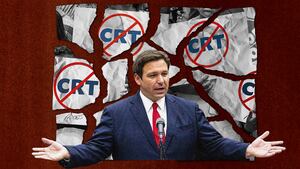This week, public education in Florida came under attack once again, when the state’s Department of Education rejected a new Advanced Placement (AP) African American Studies course from the College Board, the nonprofit that runs the nationwide program of college-level courses. The DOE wrote: “As presented, the content of this course is inexplicably contrary to Florida law and significantly lacks educational value.”
For the past year, with other education advocates, I’ve warned that educational gag orders such as Florida’s “Stop W.O.K.E. Act”—which restrict education on so-called “divisive concepts” relating to race, gender, and identity—could put at risk AP and other early college credit programs that enroll millions of students.
Now it’s happened: an AP course, developed by acclaimed scholars such as Harvard’s Henry Louis Gates Jr., and piloted in a Florida classroom, has been banned because politicians disagree with its scholarship, and lawmakers have made viewpoint-based censorship of classroom subjects legal.
That’s bad for free speech and for educational practice, and it's especially worrisome for Florida high school students. When politicians go to war with teachers, students always lose.
Nearly 1.2 million high school students took an AP test in 2021, with over 750,000 receiving a score of at least 3 out of 5 on at least one test, the minimum score some colleges will accept for college credit. (Other colleges award credit only for scores of 4 or 5.) Those students earned a transferable college-level credential at a fraction of the cost of college tuition—just $97 for a successful test worth three or four college credits, which allows them to amass college credits early, thereby cutting the tuition and time it takes to graduate from college.
It’s that access to earlier and less expensive college-level material that the governor’s action will deny to Florida students. In a September essay criticizing the AP African American Studies course, commentator Stanley Kurtz wrote that the course “will siphon off students from American history and other more conventional subject areas.” But there’s no evidence that’s the case.
In fact, AP African American Studies could well provide additional course credit for students who have already passed the AP U.S. or World History tests, or attract new students who find the subject matter more stimulating than that of the existing courses. Banning the course from Florida schools seems more likely to reduce the number of students studying related material or gaining AP credits. And it’s worth noting that when Arizona banned ethnic studies courses in 2010, a federal judge ruled the ban unconstitutional and “motivated by racial animus” to pursue “discriminatory ends.”
Further, the ban on AP African American Studies makes plain the openly censorious intent of educational gag order laws. The Florida DOE’s statement that the course content is “contrary to Florida law” presumably references the state's “Stop W.O.K.E. Act.” This law, which is facing numerous challenges to its constitutionality and is currently partially restricted by a preliminary injunction, bans course content that “espouses, promotes, advances, inculcates, or compels” a student to believe in specific concepts about “race, color, sex, or national origin.” Yet the course does none of those things; it merely presents essays from historical thinkers that help students understand the history of African American thought.
But we now know that Florida’s gag order law bans that, too. Because the law requires courses to be “consistent” with a set of principles that include support for colorblindness and meritocracy and rejection of the concept of unconscious bias (social stereotypes about groups that individuals form unconsciously), merely including essays in the course that present or debate these ideas would arguably be illegal if the law stands. The DOE’s letter has now made that interpretation explicit: if students are taught about ideas central to the history of African American thought, it will be in violation of Florida law.
It’s true that state governments have the power to regulate public education. But in a democracy, we must reject efforts to restrict what can be discussed in schools on narrow ideological grounds. Bans on course content and gag orders against teachers are tools of authoritarianism. They run counter to the subject-matter expertise that should shape school curricula. And it's always wrong to use educational opportunities for students as a political football, no matter which elected or appointed officials are doing it.
Lawmakers who value the reputations and effectiveness of their states’ education systems should regard this ill-advised act of censorship as a cautionary tale. This is not how public education should be governed in a democracy.
Jeremy C. Young, Ph.D., is senior manager of free expression and education at PEN America.









